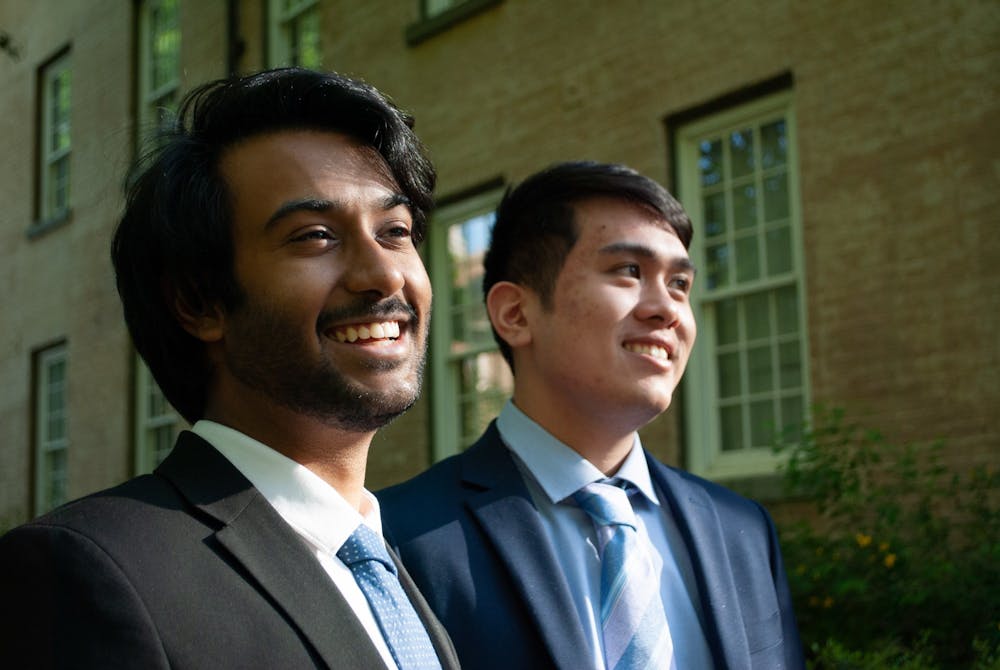“We’re digitally native, which means we’ve grown up completely with technology,” Musuvathy said. “We’re the most entrepreneurial generation in history, and we love gamification of products that like making things fun and as easy to use or as addicting as possible.”
Lux Libertas Ventures’ goals and fundraising efforts
Musuvathy said LLV’s goal is to invest $25,000 to $50,000 checks into the first investment round for any early-stage startup. Then, LLV works to partner with investors in New York, San Francisco and other cities with prominent venture capital firms to facilitate the process.
Sophomore Temoor Dard, co-founder and co-vice president of investment at LLV, said he and Kaustubh Tiwari, co-founder and co-president of investment at LLV, have been working in tandem on fundraising.
They have been using LinkedIn and the UNC General Alumni Association to cold-email people who fit their target criteria, like if they are active alumni with the necessary wealth levels to give the required check sizes.
“I think that’s the exciting thing: We have calls lined up — a lot of them in the next month — so we need to keep that momentum going and see how far we can raise by August,” he said.
By August 2021, they hope to have built up a $2.5 million fund.
Dard said the founders came from venture capital backgrounds rooted in internships and fellowships.
“We’re all good friends, so we’re not strangers that are coming together — we’ve known each other since freshman year, so that definitely helps,” Dard said. “We all want to make this our legacy, and once we move on from UNC, we grow it to a point where it’s self-sustainable and then we’ll pass it on and continue to watch from afar.”
Dard said the process of fundraising and overseeing investments makes you more analytical and capable of taking on responsibility.
“These are all things that you will need to do in a career, because there’s money — actual money — on the line, so we have to take real good care of that,” he said. “But that’s what makes it really exciting, I think, for all of us.”
Venture capital education programs
To get the day's news and headlines in your inbox each morning, sign up for our email newsletters.
Aspyn Fulcher, staff adviser for LLV and assistant director of student engagement at the Kenan-Flagler Business School’s Entrepreneurship Center, said in an email statement that she was introduced to the LLV founding team through a colleague at the undergraduate business program.
She said she was excited to learn that LLV’s mission aligned so closely with the Center’s, and was impressed by the vision behind their idea and the research they had already put into the concept.
“The feedback that the team has received from leaders at the University and in this space is that their research and professionalism is strong, especially tackling such a complex goal,” Fulcher said. “I’ve been incredibly impressed with the vision, work ethic, and perseverance of the team as they’ve worked to bring LLV to life while balancing their other demands as students.”
In addition to their focus on raising funds, she said they’ve also been mindful about developing a sustainable structure that would allow them to transition operations to future members.
She said she believes LLV will be a great compliment to the entrepreneurial ecosystem present at UNC and UNC’s partners in the Triangle.
Musuvathy said LLV wants to create a strong pipeline for students to believe that being a founder is a feasible career path after graduation. LLV also wants to build open access to venture capital education.
“In the status quo, the only way to learn about venture capital is through one or two classes in the business school that you really can’t take unless you’re already a business major,” he said.
LLV started building venture capital education programs for the wider consumer base, as well as an open-access venture capital program they are planning on launching in the fall of 2021, Musuvathy said. They even invited a diversity partner from Bain Capital, a private investment firm based in Boston, Massachusetts, to host an event, he said.
“We really are focused on not only teaching venture in the way that everyone learns at Stanford and Harvard, but also teaching venture from a diversity-first perspective so people can understand and recognize that there are a lot of opportunities possible,” Musuvathy said.
@jenniferhtran_
university@dailytarheel.com



